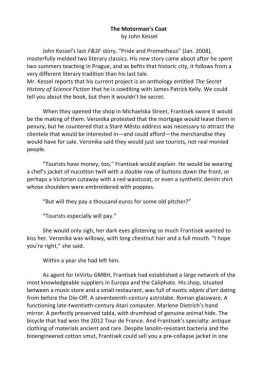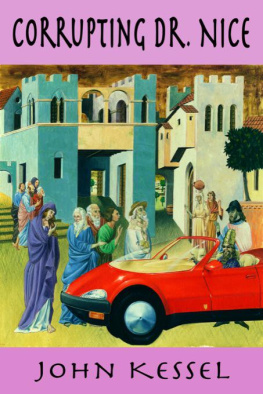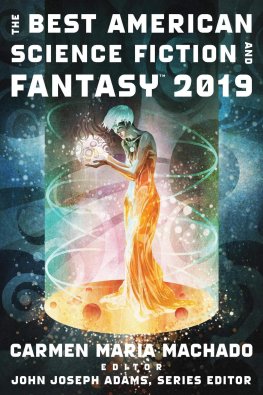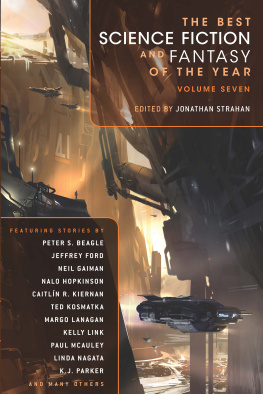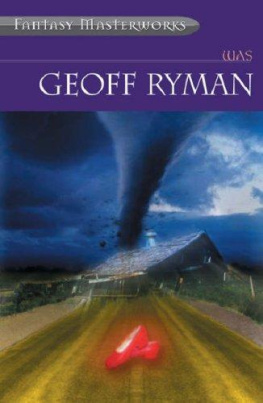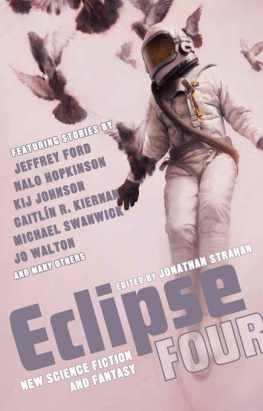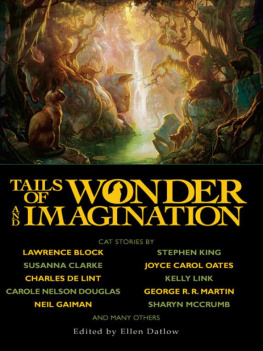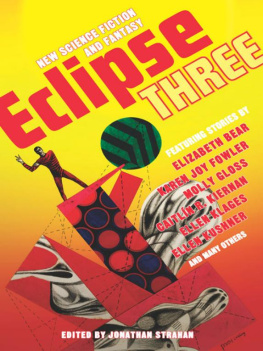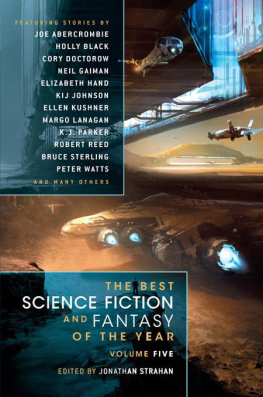Kessel - The Motormans Coat
Here you can read online Kessel - The Motormans Coat full text of the book (entire story) in english for free. Download pdf and epub, get meaning, cover and reviews about this ebook. year: 2010, genre: Detective and thriller. Description of the work, (preface) as well as reviews are available. Best literature library LitArk.com created for fans of good reading and offers a wide selection of genres:
Romance novel
Science fiction
Adventure
Detective
Science
History
Home and family
Prose
Art
Politics
Computer
Non-fiction
Religion
Business
Children
Humor
Choose a favorite category and find really read worthwhile books. Enjoy immersion in the world of imagination, feel the emotions of the characters or learn something new for yourself, make an fascinating discovery.
- Book:The Motormans Coat
- Author:
- Genre:
- Year:2010
- Rating:3 / 5
- Favourites:Add to favourites
- Your mark:
- 60
- 1
- 2
- 3
- 4
- 5
The Motormans Coat: summary, description and annotation
We offer to read an annotation, description, summary or preface (depends on what the author of the book "The Motormans Coat" wrote himself). If you haven't found the necessary information about the book — write in the comments, we will try to find it.
Kessel: author's other books
Who wrote The Motormans Coat? Find out the surname, the name of the author of the book and a list of all author's works by series.
The Motormans Coat — read online for free the complete book (whole text) full work
Below is the text of the book, divided by pages. System saving the place of the last page read, allows you to conveniently read the book "The Motormans Coat" online for free, without having to search again every time where you left off. Put a bookmark, and you can go to the page where you finished reading at any time.
Font size:
Interval:
Bookmark:
by John Kessel
John Kessels last F&SF story, Pride and Prometheus (Jan. 2008), masterfully melded two literary classics. His new story came about after he spent two summers teaching in Prague, and as befits that historic city, it follows from a very different literary tradition than his last tale. Mr. Kessel reports that his current project is an anthology entitled The SecretHistory of Science Fiction that he is coediting with James Patrick Kelly. We could tell you about the book, but then it wouldnt be secret.
When they opened the shop in Michaelska Street, Frantisek swore it would be the making of them. Veronika protested that the mortgage would leave them in penury, but he countered that a Star Msto address was necessary to attract the clientele that would be interested inand could affordthe merchandise they would have for sale. Veronika said they would just see tourists, not real monied people.
Tourists have money, too, Frantisek would explain. He would be wearing a chefs jacket of nucotton twill with a double row of buttons down the front, or perhaps a Victorian cutaway with a red waistcoat, or even a synthetic denim shirt whose shoulders were embroidered with poppies.
But will they pay a thousand euros for some old pitcher?
Tourists especially will pay.
She would only sigh, her dark eyes glistening so much Frantisek wanted to kiss her. Veronika was willowy, with long chestnut hair and a full mouth. I hope youre right, she said.
Within a year she had left him.
As agent for InVirtu GMBH, Frantisek had established a large network of the most knowledgeable suppliers in Europa and the Caliphate. His shop, situated between a music store and a small restaurant, was full of exotic objets dart dating from before the Die-Off. A seventeenth-century astrolabe. Roman glassware. A functioning late-twentieth-century Atari computer. Marlene Dietrichs hand mirror. A perfectly preserved tabla, with drumhead of genuine animal hide. The bicycle that had won the 2012 Tour de France. And Frantiseks specialty: antique clothing of materials ancient and rare. Despite lanolin-resistant bacteria and the bioengineered cotton smut, Frantisek could sell you a pre-collapse jacket in one hundred percent genuine wool and put a 1950s sateen handkerchief in its breast pocket.
On the shelf behind the counter stood a photograph of Frantisek and Veronika from nine years before. Frantisek had had the photo done in the style of a century ago, in black and white. It was from early in their marriage, when they still thought they might have a child. The two of them were about to cross Zitna Street, on their way to the Museum Dvork, leaning into each other, her face in profile smiling at him. A strong wind blew her hair back like a flag. He wore a polo coat; she had on the beautifully tailored redingote he had bought for her the day after they had first slept together.
Now Veronika was gone.
She had not been able, she claimed, to handle the stress. She did not care about antiques, and never valued the things that he considered valuable. Frantisek had known that from the beginning of their relationship, but he had told himself that his love for her would overwhelm such matters of temperament. Instead, as his savings dwindled and their customers remained few, Veronika came increasingly to blame him for everything that dissatisfied her.
As Frantisek dusted the row of vases at the rear of the store, he heard the bell of the shop door chime. He turned to find an attractive black woman entering.
Dobry den, the woman said, nodding to him.
Dobry den, he said.
The woman idly circled the shop. Frantisek tried not to follow her with his eyes, letting her have her time. She possessed the lithe slenderness of a dancer. Had he seen her at the ballet? She stopped to examine a purple ceramic elephant, the product of some childs primary school class a hundred years ago. Beside it a Peruvian bird totem, fired red clay, glazed black, inscribed with intricate lines.
You have interesting merchandise, she said.
Thank you.
She turned to face him. But your shop is not busy. She smiled.
People do not always recognize quality, Frantisek said.
Perhaps it would help if you had some item of transcendent interest. Something so rare as to attract even the purblind.
Perhaps. Such items are hard to come by.
I have one, the woman said. A motormans coat.
Frantisek laughed. I dont believe you.
The woman laughed as well. Her laugh was light, sexy. I dont blame you. Nevertheless, it is true.
A motormans coat? A Czech coat?
Praha Transportation Company, 1911, regulation issue, dark blue wool with solid brass buttons.
How did she knowdid she know?that Frantisek was a descendant of Frantisek Krizik, the engineer who in the 1890s established the second electric tram line in Praha. Where did you find this marvel?
Before she answered the door chime rang again, and in came two young people. In halting Czech the man asked if he could buy some matches. The woman took a glance around the store with indifference and turned back to the front window. These things are old, she said in English.
Frantisek gave the man a box of Kafkas and turned back to the black woman. Is this coat for sale?
For the correct price.
I would need to see it.
Of course.
Do you have any cigarettes? the man asked.
Frantisek lost his temper. Does this look like a tobacconists shop?
The man looked confused. He muttered something to his companion that Frantisek could not make out, then turned back. Youre right. It looks like a bunch of crap, he said in English. He took the womans arm and they walked out the door.
The black woman had observed this calmly. Frantisek colored at her slight smile. You should not have to deal with such people, she said.
I have little choice.
One always has choices, she said. She stuck out her hand. My name is Carlotta Olembe.
Frantisek Lanik. I would like to see this coat.
Meet me tonight, Mala Xavernova Twenty-seven, at ten p.m. The elegant woman touched his wrist with her finely manicured hand. Her fingertips were warm. Ciao, she said, and left.
Frantisek stood there wondering what had happened. The rest of the afternoon passed uneventfully, and unprofitably. At seven he closed the shop and went to his flat in Vinohrady. He washed, shaved, changed his shirt, and put on a jacket, then walked down to Dert Dnyasy, a Turkish restaurant in his neighborhood. He wondered whether this coat could be what Carlotta Olembe claimed. He wondered if she had felt the same sexual charge from him that he had gotten from her. He had not thought of a woman in that way since Veronika had left.
Just past nine he took the tram south, then across the Vlatava. The buildings shortened as the tram climbed the bluff above the river. The address Carlotta had given him was in Smchov, an industrial district in the mid-twentieth which had been renovated after the fall of the Communists, only to suffer another decline in the disasters that had depopulated the city in the mid-twenty-first. Now it was coming back again. Biological buildings, edible ornamental hedges, brick walkways.
Mala Xavernova was a street of tree houses, underground clubs, new gardens. Frantisek wandered with groups of idlers out for the evening. Most of the people here were Czech, not tourists. Luminescents grew among the branches of fruit trees laden with fragrant blossoms. Number 27 was an organic building that must have been planted thirty years ago, in the aftermath. Between the buildings massive buttress roots, beneath a neon sign announcing Ne Omluva, stood an open door. Frantisek heard the sounds of jazz as he stepped into the club. Smoke swirled over small tables in the crowded room. He spotted Carlotta sitting on a stool by the bar.
Next pageFont size:
Interval:
Bookmark:
Similar books «The Motormans Coat»
Look at similar books to The Motormans Coat. We have selected literature similar in name and meaning in the hope of providing readers with more options to find new, interesting, not yet read works.
Discussion, reviews of the book The Motormans Coat and just readers' own opinions. Leave your comments, write what you think about the work, its meaning or the main characters. Specify what exactly you liked and what you didn't like, and why you think so.

